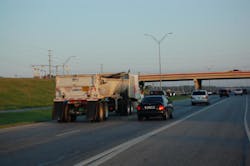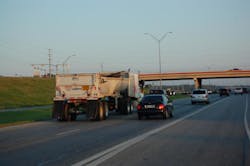Could enjoyment be a key to recruiting and retention?
Here’s something motor carriers may or may not think about when it comes to truck driver recruiting and retention: enjoyment.
Whoa, wait a minute, you may say: folks don’t plan on driving trucks for a living unless they enjoy at least some aspect of piloting big rigs on the asphalt, right?Well, if the results of a new global career survey of workers by Right Management – a division of human resources consulting firm ManpowerGroup – are to be believed, “enjoyment” on the job encompasses many factors, from good work/life balance to respect from managers and peers.
In fact, at least according to Right management’s findings, “enjoyment on the job” often trumps pay – but that doesn’t mean pay is a non-factor, though; not by a long shot.
That’s why understanding employee career motivations and aspirations are critical to creating what Mara Swan, global leader of Right Management and executive vice president of ManpowerGroup, dubs a “high performance culture” that “motivates individuals to do their best work.”
The firm’s survey, by the way, polled 1,225 workers worldwide in the third quarter last year, including countries such as: Canada, the U.S., Belgium, France, Germany, Switzerland, the U.K., Australia, India and Singapore.
Here’s what that poll uncovered:
- Employees rank work/life balance higher than performance: some 45% of employees aspire to achieve work/life balance, which is more than double the number of employees that rank being the best at what they do (17%) as their top career aspiration. In Europe, 55% of employees aspire for work/life balance, followed by Asia Pacific (37%) and North America (35%).
- Big generational differences exist regarding workplace goals: Interestingly, Millennials (14%) are least likely to aspire to be the best at what they do compared to Baby Boomers (22%) and members of the Gen X generation (17%). Only 3% of employees globally aspire to achieve a prominent position.
- When it comes to success, enjoyment/happiness at work trumps performance and salary: some 26% of employees define success in the workplace as enjoyment/happiness, followed by salary (19%), doing the best work (18%), respect and recognition (15%) and high performance (10%).
- Differences exist based on geography and generations: Broken out by geography, the desire for “high performance” ranks lowest in Europe (8%) and highest in Asia (14%), with North America at 12%. Across generations, defining workplace success as “high performance” is reported tagged by 10% of Millennials, 11% of Gen X members and by 8% of Baby Boomers.
- Leaders need to show respect: about 53% of employees say respect for their knowledge and experience is their top expectation of leadership. Others include mutual trust (51%), transparency (37%), learning and development (32%) and a relationship of equals regardless of job title (30%). In Europe, mutual trust is the top expectation of leadership. The expectation for learning and development opportunities ranks highest in Asia (34%), followed by Europe (32%) and North America (29%).
- Mutual Trust is Expected of Colleagues: some 59% of employees want mutual trust from their colleagues at work, followed by respect for their knowledge (48%), a relationship of equals (46%) and transparency (41%). In North America, respect for employee knowledge ranks as the number one expectation of peers in the workplace (54%). In Europe, 67% off employees expect mutual trust from colleagues, which represents the highest response percentage in the survey. Baby Boomers worldwide expect mutual trust (65%) from their colleagues, compared with Gen X (61%) and Millennials (51%),
- Employees will leave for work/life balance and higher pay: the top motivations for changing jobs are the desire for work/life balance and higher compensation (both 35%), followed by seeking a different work culture and wanting more challenging assignments (both 25%). In Asia, 54% of employees are motivated to change jobs for better work/life balance, followed by 41% in North America and 24% in Europe.
Trends to contemplate as the trucking industry continues to grapple with ways to recruit and retain new drivers.

